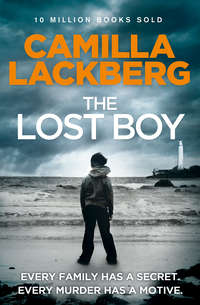
Полная версия
Camilla Lackberg Crime Thrillers 1 and 2: The Ice Princess, The Preacher
She met no one until she had walked halfway up Galärbacken. It was an encounter she would have preferred to avoid, and she instinctively looked for a possible escape route.
‘Good morning.’ Elna Persson’s voice chirped with unabashed sprightliness. ‘Well, if it isn’t our little authoress out walking in the morning sun.’
Erica cringed inside.
‘Yes, I was just on my way down to Eva’s to do a little shopping.’
‘You poor dear, you must be completely distraught after such a horrible experience.’
Elna’s double chins quivered with excitement, and Erica thought she looked like a fat little sparrow. Her woollen coat was shades of green and covered her body from her shoulders to her feet, giving the impression of one big shapeless mass. Her hands had a firm grip on her handbag. A disproportionately small hat was balanced on her head. The material looked like felt, and it too was an indeterminate moss-green colour. Her eyes were small and deeply set in a protective layer of fat. Right now they were fixed on Erica. Clearly she was expected to respond.
‘Yes, well, it wasn’t very pleasant.’
Elna nodded sympathetically. ‘Yes, I happened to run into Mrs Rosengren and she told me that she drove past and saw you and an ambulance outside the Carlgrens’ house, and we knew at once that something horrid must have happened. And later in the afternoon when I happened to ring Dr Jacobsson, I heard about the tragic event. Yes, he told me in confidence, of course. Doctors take an oath of confidentiality, and that’s something one has to respect.’
She nodded knowingly to show how much she respected Dr Jacobsson’s oath of confidentiality.
‘So young and all. Naturally one has to wonder what could be the reason. Personally I always thought she seemed rather overwrought. I’ve known her mother Birgit for years, and she’s a woman who has always been a bundle of nerves, and everyone knows that’s hereditary. She turned all stuck-up, too, Birgit I mean, when Karl-Erik got that big management job in Göteborg. Then Fjällbacka wasn’t good enough for her anymore. No, it was the big city for her. But I tell you, money doesn’t make anyone happy. If that girl had been allowed to grow up here instead of pulling up roots and moving to the big city, things wouldn’t have ended this way. I think they even packed the poor girl off to some school in Switzerland, and you know how things go at places like that. Oh yes, that sort of thing can leave a mark on a person’s soul for the rest of her life. Before they moved away from here, she was the happiest and liveliest little girl one could imagine. Didn’t you two play together when you were young? Well, in my opinion …’
Elna continued her monologue, and Erica, who could see no end to her misery, feverishly began searching for a way to extricate herself from the conversation, which was beginning to take on a more and more unpleasant tone. When Elna paused to take a breath, Erica saw her chance.
‘It was terribly nice talking to you, but unfortunately I have to get going. There’s a lot to be done. I’m sure you’ll understand.’
She put on her most pathetic expression, hoping to entice Elna onto this sidetrack.
‘But of course, my dear. I wasn’t thinking. All this must have been so hard for you, coming so soon after your own family tragedy. You’ll have to forgive an old woman’s thoughtlessness.’
By this point Elna was almost moved to tears, so Erica merely nodded graciously and hurried to say good-bye. With a sigh of relief she continued walking to Eva’s Mart, hoping to avoid any more nosy ladies.
But luck was not with her. She was grilled mercilessly by most of the excited residents of Fjällbacka, and she didn’t dare breathe freely until her own house was within sight. But one comment she heard stayed with her. Alex’s parents had arrived in Fjällbacka late last night and were now staying with her aunt.
Erica set the bags of groceries on the kitchen table and began putting away the food. Despite all her good intentions, the bags were not as full of staples as she had planned before she walked into the shop. But if she couldn’t buy herself treats on a day as miserable as this, when could she? As if on signal, her stomach started growling. With a flourish, she plopped twelve Weight Watchers points onto a plate in the form of two cinnamon buns. She ate them with a cup of coffee.
It felt wonderful to sit and look at the familiar view outside her window, but she still hadn’t got used to the silence in the house. She had been at home alone before, of course, but it wasn’t the same thing. Back then there had been a presence, an awareness that somebody could walk through the door at any moment. Now it seemed as if the soul of the house had gone.
Pappa’s pipe lay by the window, waiting to be filled with tobacco. The smell still lingered in the kitchen, but Erica thought it was getting fainter each day.
She had always loved the smell of a pipe. When she was little she often sat on her father’s lap and closed her eyes as she leaned against his chest. The smoke from the pipe had settled in all his clothing, and the scent had meant security in the world of her childhood.
Erica’s relationship with her mother was infinitely more complicated. She couldn’t remember a single time when she was growing up that she’d ever received a sign of tenderness from her mother; not a hug, a caress, or a word of comfort. Elsy Falck was a hard and unforgiving woman who kept their home in impeccable order but who never allowed herself to be happy about anything in life. She was deeply religious, and like many in the coastal communities of Bohuslän, she had grown up in a town that was still marked by the teachings of Pastor Schartau. Even as a child she had been taught that life would be endless suffering; the reward would come in the next life. Erica had often wondered what her father, with his good nature and humorous disposition, had seen in Elsy, and on one occasion in her teens she had blurted out the question in a moment of fury. He didn’t get angry. He just sat down and put his arm round her shoulders. Then he told her not to judge her mother too harshly. Some people have a harder time showing their feelings than others, he explained as he stroked her cheeks, which were still flushed with rage. She refused to listen to him then, and she was still convinced that he was only trying to cover up what was so obvious to Erica: her mother had never loved her, and that was something she would have to carry with her for the rest of her life.
Erica decided on impulse to visit Alexandra’s parents. Losing a parent was hard, but it was still part of the natural order of things. Losing a child must be horrible. Besides, she and Alexandra had once been as close as only best friends can be. Of course, that was almost twenty-five years ago, but so many of her happiest childhood memories were intimately associated with Alex and her family.
The house looked deserted. Alexandra’s maternal aunt and uncle lived in Tallgatan, a street halfway between the centre of Fjällbacka and the Sälvik campground. All the houses were perched high up on a slope, and their lawns slanted steeply down towards the road on the side facing the water. The main door was in the back of the house, and Erica did not hesitate before ringing the doorbell. The sound reverberated and then died out. Not a peep was heard from inside, and she was just about to turn and leave when the door slowly opened.
‘Yes?’
‘Hi, I’m Erica Falck. I’m the one who …’
She left the rest of her sentence hanging in mid-air. She felt foolish for introducing herself so formally. Alex’s aunt, Ulla Persson, knew very well who she was. Erica’s mother and Ulla had been active in the church group together for many years, and sometimes Ulla would come over on Sundays for coffee.
She stepped aside and let Erica into the entryway. Not a single light was lit in the entire house. Of course, it wouldn’t be evening for several hours yet, but the afternoon dusk was beginning to descend and the shadows were growing longer. Muted sobs could be heard from the room straight down the hall. Erica took off her shoes and coat. She caught herself moving extremely quietly and cautiously because the mood in the house permitted nothing else. Ulla went into the kitchen and let Erica find her own way. When she entered the living room, the weeping stopped. On a sectional sofa in front of an enormous picture window, Birgit and Karl-Erik Carlgren sat desperately holding on to each other. Both had wet streaks running down their faces, and Erica felt that she was trespassing in an extremely private space. Perhaps she shouldn’t intrude. But it was too late to worry about that now.
She sat down cautiously on the sofa facing them and clasped her hands in her lap. No one had yet uttered a word since she entered the room.
‘How did she look?’
At first Erica didn’t understand what Birgit had said. Her voice was tiny, like a child’s. Erica didn’t know what to answer.
‘Lonely,’ was what finally came out, and she regretted it at once. ‘I didn’t mean …’ The sentence faded away and was absorbed by the silence.
‘She didn’t kill herself!’
Birgit’s voice all at once sounded strong and determined. Karl-Erik squeezed his wife’s hand and nodded in agreement. They probably noticed Erica’s sceptical expression, because Birgit repeated: ‘She didn’t kill herself! I know her better than anyone, and I know that she would never be capable of taking her own life. She would never have had the courage to do it! You must realize that. You knew her too!’
She straightened up a bit more with each syllable, and Erica saw a spark light up in her eyes. Birgit was opening and closing her hands convulsively, over and over, and she looked Erica straight in the eye until one of them was forced to look away. It was Erica who yielded first. She shifted her gaze to look around the room. Anything to avoid fixing her eyes on the grief of Alexandra’s mother.
The room was cosy but a bit over-decorated for Erica’s taste. The curtains had been skilfully hung with enormous flounces matching the sofa pillows that had been sewn from the same floral fabric. Knick-knacks covered every available surface. Hand-carved wooden bowls decorated with ribbons with cross-stitch embroidery shared the room with porcelain dogs with eternally moist eyes. What saved the room was the panoramic window. The view was wonderful. Erica wished that she could freeze the moment and keep looking out the window instead of being drawn into the grief of these people. Instead she turned her gaze back to the Carlgrens.
‘Birgit, I’m really not sure. It was twenty-five years ago that Alexandra and I were friends. I really don’t know a thing about her. Sometimes you just don’t know someone as well as you think you do …’
Even Erica could hear how lame this sounded. Her words seemed to ricochet off the walls. This time Karl-Erik spoke up. He extricated himself from Birgit’s convulsive grip and leaned forward as if wanting to make sure that Erica wouldn’t miss one word of what he intended to say.
‘I know it sounds as if we’re denying what happened, and perhaps we’re not presenting a very coherent impression right now. But even if Alex did take her own life for some reason, she would never, and I repeat never, have done it this way! You probably remember that Alex was always hysterically afraid of blood. If she got the slightest cut she was absolutely uncontrollable until someone put a bandage on it. Sometimes she even fainted when she saw blood. That’s why I’m quite sure that she would have chosen some other method, like sleeping pills, for instance. There is no way in hell that Alex could have managed to take a razor blade and cut herself, first on one arm and then on the other. And then, it’s like my wife says: Alex was fragile. She was not a courageous person. An inner strength is required for someone to decide to take her own life. She didn’t have that kind of strength.’
His voice was compelling. Even though Erica was still convinced that she was listening to the hope of two people in despair, she couldn’t help feeling a flicker of doubt. When she thought about it, there was something that hadn’t felt right when she stepped into that bathroom yesterday morning. Not because it would ever feel right to discover a dead body, but there was something about the atmosphere in the room that didn’t really fit. A presence, a shadow. That was as close to a description as she could come. She still believed that something had driven Alexandra Wijkner to suicide, but she couldn’t deny that something about the Carlgrens’ stubborn insistence had struck a chord.
It suddenly occurred to her how much the adult Alex looked like her mother. Birgit Carlgren was petite and slender, with the same light-blonde hair as her daughter, except that instead of Alex’s long mane she wore hers cut in a chic page-boy. Birgit was dressed all in black, and despite her sorrow she seemed aware of what a startling appearance she made, thanks to the contrast between light and dark. Tiny gestures betrayed her vanity. A hand carefully patting her coiffure, a collar straightened to perfection. Erica recalled that Birgit’s wardrobe had seemed a veritable Mecca to eight-year-olds who loved to dress up, and her jewellery case had been the closest thing to heaven they could imagine in those days.
Next to Birgit, her husband looked ordinary. Far from unattractive, but simply unremarkable. Karl-Erik Carlgren had a long, narrow face engraved with fine lines. His hairline had receded far up his scalp. He too was dressed all in black, but unlike his wife the colour made him look even greyer. Erica could sense that it was time for her to leave. She wondered what she actually had wanted to accomplish by visiting them.
She stood up and the Carlgrens did too. Birgit gave her husband an urgent look, as if exhorting him to say something. Apparently it was something they had discussed before Erica arrived.
‘We’d like you to write an article about Alex. For publication in Bohusläningen. About her life, her dreams – and her death. A commemoration of her life. It would mean a great deal to Birgit and me.’
‘But wouldn’t you rather have something in Göteborgs-Posten? I mean, she did live in Göteborg, after all. And you do too, for that matter.’
‘Fjällbacka has always been our home, and it always will be. And that was true for Alex too. You can start by talking to her husband Henrik. We spoke with him and he’s willing to help. Of course you’ll be compensated for all your expenses.’
With that they apparently considered the subject closed. Without actually having accepted the assignment, Erica found herself standing outside on the steps, with the telephone number and address of Henrik Wijkner in her hand, as the door closed behind her. Even though she really had no desire to take on this task, to be perfectly honest the germ of an idea had begun to sprout in her writer’s brain. Erica pushed away the thought and felt like a bad person for even thinking it, but it was persistent and refused to go away. An idea for a new book of her own, an idea that she had long been searching for, was right here in front of her. The account of a woman’s path towards her destiny. An explanation of what had driven a young, beautiful, and obviously privileged woman to a self-inflicted death. She would not mention Alex’s name, of course, but it would be a story based on what she could dig up about the path she had taken towards death. To date Erica had published four books, but they were all biographies about other prominent female authors. The courage to create her own stories had not yet emerged, but she knew that there were books inside her just waiting to be put down on paper. This one might give her the push she needed, the inspiration she’d been waiting for. The fact that she had once known Alex would only be to her advantage.
As a human being she writhed with repugnance at the thought, but as a writer she was jubilant.
The brush spread broad swathes of red across the canvas. He had been painting since dawn, and for the first time in several hours he now took a step back to look at what he had created. To the untrained eye it was merely large patches of red, orange and yellow, irregularly arranged over the large canvas. For him it was humiliation and resignation re-created in the colours of passion.
He always painted using the same colours. The past shrieked and mocked him from the canvas, and now he went back to painting with growing frenzy.
After another hour he realized that he had earned the first beer of the morning. He took the tin standing closest to him, ignoring the fact that he had flicked cigarette ashes into it sometime the night before. Flakes of ash stuck to his lips, but he eagerly downed the stale beer, then tossed the tin to the floor after he had slurped the last drop.
His underwear, which was all he was wearing, was yellow in front from beer or dried urine, he couldn’t tell which. Possibly a combination of the two. His greasy hair hung over his shoulders, and his chest was pale and sunken. The overall impression of Anders Nilsson was of a wreck, but the painting that stood on his easel showed a talent that was in sharp contrast to the artist’s own degeneration.
He sank to the floor and leaned against the wall to face the painting. Next to him lay an unopened can of beer, and he liked the popping sound it made when he pulled the tab. The colours shrieked loudly at him, reminding him of something he had spent the greater part of his life trying to forget. Why in hell was she going to ruin everything now! Why couldn’t she just let things be? That selfish fucking whore, she was thinking only of herself. Sweet and innocent as a bloody princess. But he knew what was beneath the surface. They were cast from the same mould. Years of mutual pain had shaped them, welding them together, yet suddenly she thought she could unilaterally change the order of things.
‘Shit.’
He roared and flung the half-full can of beer straight at the canvas. It didn’t rip, which infuriated him even more. The canvas merely buckled and the can slid to the floor. The liquid sprayed across the painting, and red, orange and yellow began to flow together, blending into new shades. He observed the effect with satisfaction.
He still hadn’t sobered up after yesterday’s 24-hour binge. The beer did its work quickly despite his many years of hard drinking and his high tolerance for alcohol. He slowly sank into the familiar fog with the smell of old vomit hanging in his nostrils.
She had her own key to the flat. In the hall, she carefully wiped off her shoes, although she knew it was a complete waste of time. Things were cleaner outdoors. She set down the bags of groceries and hung her coat neatly on a hanger. It wasn’t a good idea to announce her arrival. By this time he had probably already passed out.
The kitchen to the left of the entryway was in its usual wretched state. Several weeks’ worth of dirty dishes were stacked up, not only in the sink but on the table and chairs and even on the floor. Fag-ends, beer cans, and empty bottles were everywhere.
She opened the door of the fridge to put in the food and saw that she was in the nick of time. It was completely empty. She spent several minutes putting things away, and then it was full again. She stood still for a moment, marshalling her strength.
The flat was a small bed-sit. She was the one who had brought in the few pieces of furniture, but there wasn’t much she could contribute. The room was dominated by the big easel next to the window. A shabby mattress was flung in one corner. She could never afford to buy him a regular bed.
At first she had tried to help him keep everything tidy, both the flat and himself. She mopped, picked up after him, washed his clothes and even gave him baths. Back then she still hoped that everything would turn around. That everything would blow over by itself. But that was many years ago now. Somewhere along the way she just couldn’t face it anymore. Now she contented herself with seeing that at least he had food to eat.
She often wished that she still had the energy. Guilt weighed heavy on her shoulders and chest. In the past when she knelt down to wipe up his vomit, she had sometimes felt for a moment that she was paying off some of that guilt. But now she bore it without hope.
She looked at him as he lay slumped against the wall. A foul-smelling wreck, but with an incredible talent hidden behind that filthy exterior. Countless times she had wondered how things would have been if she had made a different choice that day. Every day for twenty-five years she had wondered how life would have turned out if she had acted differently. Twenty-five years is a long time to brood.
Sometimes she just let him lie there on the floor when she left. The cold had seeped in from outside, and the floor felt ice cold to her feet through the thin tights. She pulled on his arm that hung limp and lifeless at his side. He didn’t respond. Wrapping both hands around his wrist, she dragged him towards the mattress. She tried to roll him onto it and shuddered a little when she pressed her hands against the slack flesh of his waist. After a bit of manoeuvring she got most of his body onto the mattress. Since there was no blanket she took his jacket from the entryway and spread it over him. The effort made her pant, and she sat down. Without the strength in her arms that many years of cleaning had given her, she would never have managed this at her age. She was worried about what would happen on the day she could no longer physically cope with the effort.
A lock of greasy hair had fallen over his face, and she tenderly brushed it aside with her index finger. Life had not turned out the way she had imagined for either of them, but she would devote the rest of hers to preserving what little they had left.
People averted their eyes when she met them in the street, but not quickly enough that she didn’t notice the look of pity. Anders was notorious in the whole town, and a permanent member of the local AA. Sometimes he would stagger through town when he was drunk, screaming abuse at everyone he met. He received the loathing and she received the pity. Actually, it should have been the other way round. She was the one who was loathsome, and Anders the one who deserved pity. It was her weakness that had shaped his life. But she would never again be weak.
She sat there for several hours, stroking his forehead. Sometimes he would stir in his sleep, but he was soothed by her touch. Outside the window life went on as usual, but inside that room time stood still.
Monday came with temperatures above freezing and clouds heavy with rain. Erica was always a careful driver, but now she drove a bit slower to give herself some leeway in case she happened to skid. Driving wasn’t her strong suit, but she preferred the solitude of a car to being crowded into the E6 express bus or the train.
When she turned right onto the motorway the condition of the road improved and she allowed herself to increase her speed a bit. She was supposed to meet Henrik Wijkner at noon, but she had left Fjällbacka early and had plenty of time for the trip to Göteborg.
For the first time since she saw Alex in that icy-cold bathroom she thought about the phone conversation with Anna. She still had a hard time imagining that Anna would really go through with selling the house. It was their childhood home, after all, and their parents would have been upset if they knew. But anything was possible when Lucas was involved. It was because she could see how lacking in scruples he was that she even considered the likelihood. He kept sinking to ever lower depths, but this was far beyond almost anything he’d done before.
But before she seriously began worrying about the house, she ought to find out where she stood from a purely legal point of view. Until then, she refused to let Lucas’s latest ploy get her down. Right now, she had to concentrate on the upcoming talk with Alex’s husband.
Henrik Wijkner had sounded pleasant on the telephone, and he had already heard the news when she rang. Of course she could come over and ask him questions about Alexandra, since the memorial article was so important to her parents.









